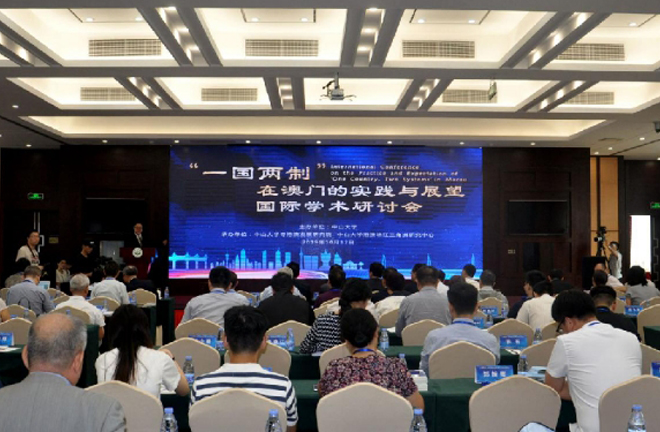‘One country, two systems’ key to Macao’s prosperity, stability

The International Conference on the Practice and Expectation of “One Country, Two Systems” in Macao was held at Sun Yat-sen University on Oct. 12. Photo: Southcn.com
After Macao’s return to China in 1999, the central government decided to adopt the policy of “one country, two systems”: China’s mainland shall implement a socialist system, while Macao’s previous capitalist system shall remain unchanged for 50 years. Over the past 20 years, Macao’s economy and society have developed rapidly and steadily. Recently, scholars from home and abroad attended the International Conference on the Practice and Expectation of “One Country, Two Systems” in Macao at Sun Yat-sen University (SYSU).
Zhang Yong, deputy director of the Macao Special Administrative Region Basic Law Committee of the Standing Committee of the National People’s Congress, said that since Macao’s return to China, the Macao Special Administrative Region (SAR) government and people have firmly maintained the authority of the Constitution of the People’s Republic of China and the Macao Basic Law, which provides a favorable social and political environment for the successful practice of one country, two systems in Macao. While safeguarding national sovereignty, security and interests, the Macao SAR also takes advantage of its high autonomy to promote political restructuring, improve the legal system, develop the economy, and advance social harmony and stability.
Lin Wu, a member of the Chinese People’s Political Consultative Conference and chairman of the Institute of Guangdong, Hong Kong and Macao Development Studies at SYSU, said that the successful practice of one country, two systems in Macao provides us with many useful attributes. First of all, following the trends of China’s overall development is an important driving force for Macao to maintain long-term prosperity and stability. With the support of the central government, the Macao SAR plays a bridge role in China’s opening up. Through the construction of “one platform, three centers,” including the Business and Trade Cooperation Service Platform for China and Portuguese-Speaking Countries, a food product distribution center, a center for conventions and exhibitions for economic and trade cooperation, and a commercial and trade service center for small and medium enterprises between China and Portuguese-speaking countries, Macao plays a unique role in the construction and development of the Belt and Road (B&R) initiative and the Guangdong-Hong Kong-Macao Greater Bay Area. Second, strictly acting by the Constitution and the tenets of the Macao Basic Law is a fundamental guarantee for the development of Macao’s democratic legal system. The Constitution and the Macao Basic Law together constitute the legal framework of the Macao SAR. The spirit of the Macao people governing Macao and the high degree of autonomy reflected in the aforementioned basic law greatly enhance the economic, political and cultural vitality of Macao.
Zhang added that the construction of the Guangdong-Hong Kong-Macao Greater Bay Area is a far-reaching national strategy to promote the development of the one country, two systems policy. It is the only way for Hong Kong and Macao to integrate into the holistic development of China.
Macao’s existing single-product industrial structure and its weak ability to reduce potential risks are urgent problems that need to be solved. Rao Geping, a professor from the law school at Peking University, said that it is difficult to transform the structure and achieve economic diversity in Macao. The government could strengthen its support in areas such as finance, taxation, land management and introduction of talent, facilitate the development of diverse industries other than the gambling industry, and guide social capital toward emerging industries such as technological and financial industries.
Yang Daokuang, deputy director of the Macao Foundation Research Institute, said that developing the marine economy may be the way out of the single-product economy. Macao was once an important trading city along the ancient Maritime Silk Road. With the construction of the B&R initiative and the Guangdong-Hong Kong-Macao Greater Bay Area, Macao can develop itself as a port city to facilitate trade and cooperation between countries along the 21st Century Maritime Silk Road, especially among Portuguese-speaking countries.
Chen Guanghan, a professor from the Institute of Guangdong, Hong Kong and Macao Development Studies at SYSU, said that in the new era, the Macao government should shoulder its responsibilities and plan strategically to create innovative platforms and establish industrial development funds for national and regional economic development.
edited by YANG LANLAN
